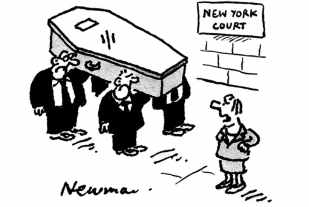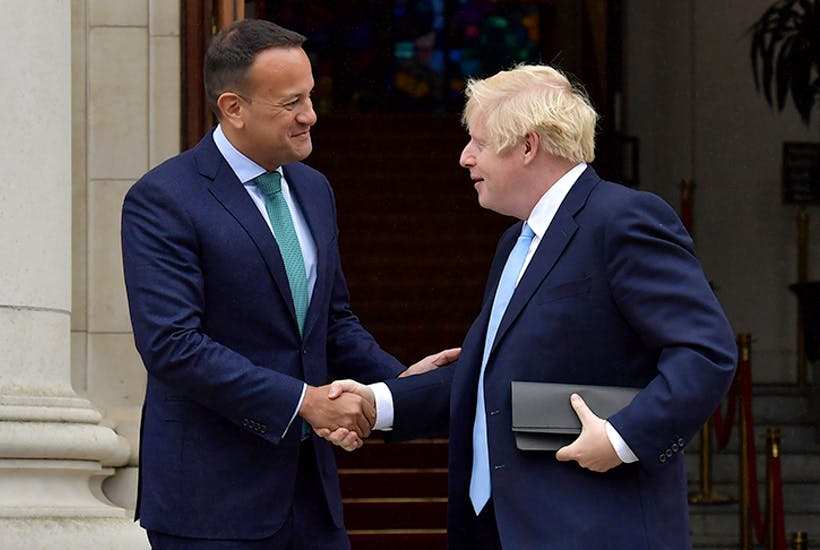Back in October, Boris Johnson and the Taoiseach Leo Varadkar met for ‘last-ditch’ Brexit talks at a hotel on the Wirral. After nine years in power and having lost control of parliament, the Tories were in disarray. Few thought Johnson could win concessions on the Irish backstop — that perennial stumbling block, the key to securing a new withdrawal agreement with Brussels. ‘It will be very difficult,’ said Varadkar, as the Merseyside ‘wedding venue’ summit began. Yet Johnson wooed the Irish delegation, got his concessions, struck a fresh EU exit deal — and went on to clinch a dramatic general election victory.
Three months on, the tables have turned. For Varadkar’s Fine Gael party has also been in power for nine years and, having lost control of the Dáil, or Irish parliament, must now face the electoral music too. On Tuesday, the Taoiseach was forced to call a general election. Until very recently, he said he wanted to go to the polls in late spring or early summer. His position in the Dáil became untenable and an election inevitable. It will take place on 8 February.
With the UK’s EU departure imminent, and all hope of a second referendum gone, Varadkar has changed his tune. ‘We’re going to beef up and deepen co-operation between Britain and Ireland after Brexit,’ he said in Belfast this week, meeting with Johnson to mark, after a three-year hiatus, the restoration of power-sharing at Stormont.
Yet it is far from clear whether Varadkar will match Johnson’s achievement and regain power. In fact, he is odds-on to lose. Opinion polls have the centre-right Fine Gael just marginally ahead of Fianna Fáil, the centre-left main opposition party led by Micheál Martin. But recent local elections have seen Martin’s party make headway in Dublin, reversing a decade-long trend in the capital. The Paddy Power betting site says Martin has a 60 per cent chance of winning.
Swept into office in 2011, Fine Gael had a bruising first five years in office under Enda Kenny. After the excesses of the ‘Celtic Tiger’ boom, the party won few thanks for dragging Ireland back from an economic abyss, which included the ignominy of a highly controversial EU bailout. After the 2016 election, in which Fianna Fáil made huge gains, Kenny clung on, leading a minority administration before being replaced by Varadkar in June 2017.

That sparked a prolonged honeymoon, with Fine Gael well ahead in the polls. Varadkar’s elevation to the highest political office — at the age of just 38, the openly gay son of an Indian immigrant — symbolised a new, more tolerant Ireland. He won plaudits for his harder line on defending Ireland’s interests during the Brexit talks, while basking in the success of a national referendum legalising abortion.
Yet serious controversies have arisen and worsened on his watch — with opposition parties likely to focus their fire on health and housing. Some of his ministerial appointments have appeared illogical. Varadkar’s obsession with spin and image–making — from jogging with the Canadian Prime Minister Justin Trudeau to his starstruck fan letter to pop singer Kylie Minogue — has tried the patience of much of the Irish public.
Fine Gael has also partly lost its hard-earned reputation for budgetary prudence, with the official spending watchdog recently concluding that ‘the government’s medium-term plans are not credible’ — a big deal in a country which so polls stared down the barrel of fiscal collapse.
In 2018, Varadkar had an 11-point polling lead over Fianna Fáil and resisted significant internal pressure to call a snap election. Now Ireland’s two main parties are virtually neck-and-neck — but Martin’s party most definitely has the momentum.
Having led Fianna Fáil since 2011, Martin is a seasoned campaigner. He has rebuilt his party’s reputation after, a decade ago, it led the Irish economy ‘off a cliff’. With two previous election losses as leader, though, this is his last chance of high office. That’s why Fine Gael will go after Martin personally, stressing that he was part of the government whose actions provoked the bailout.
Fine Gael hopes to remind voters of what it sees as its sure-footed handling of the border negotiations
Above all, with Brexit happening on 31 January, as campaigning goes into its final week, Fine Gael hopes to benefit from voters being reminded by what it sees as its sure-footed handling of the border negotiations. While opposition parties point to the Dáil consensus on Brexit, Varadkar is asking for time to finish the job, with a role in the subsequent negotiation of a UK-EU trade deal. ‘Brexit isn’t done yet — it’s only half time,’ he told reporters in Dublin, as he announced the election date.
Since 2016, the two fierce rival parties of Irish politics — their joint roots going back almost 100 years, to the country’s civil war — have been locked in their own power-sharing agreement. But with both refusing to govern with Sinn Féin, the third-biggest parliamentary party, resurgent smaller groups, including the Greens, could decide who leads the next government.
That’s why this election will be fought so hard, with both sides of the Irish political establishment’s old firm vying to get an edge, moving their previous vote shares up from 25 and 27 per cent respectively into the mid-30s — so they can lead a multi-party coalition that excludes their main rival. And within this dynamic, the parties’ attitudes towards the UK and Brexit could be where this election is won and lost.
Before Johnson’s election victory, when Brexit still looked reversible, Varadkar’s approach towards the UK-EU withdrawal negotiations was anything but helpful from Britain’s perspective. With Brussels keen to scupper the June 2016 referendum result, and Dublin keen to win Eurocrat favour, a maximalist, ultra-legalistic approach to the Irish land border was the order of the day.
Were the UK to leave the EU’s single market and customs unions, the Irish maintained, it would be ‘simply impossible’ to avoid new infrastructure on the Irish border — which would, in turn, reignite sectarian violence. No matter that countless studies presented to the Irish, British and European parliaments said this was nonsense. The name of the game was to make Brexit seem as difficult as possible, sapping Westminster’s will to go through with it. Related ‘Brit-bashing’ also helped to drum up domestic nationalist support for Fine Gael, a party which, since the 1920s, has been seen as less patriotic than its Fianna Fáil rival.
The UK election changed all that — and could impact this upcoming Irish election profoundly. Brexit is now a done deal. So rather than leading the charge to prevent Britain reaching an agreement with Brussels, Dublin has every incentive over the coming months to encourage the EU and the UK to get on. Britain accounts for around a fifth of Irish trade, generating more than a billion euros each week.
While pledging to ‘beef up’ UK-Irish co-operation on Monday, Varadkar stayed silent as Johnson repeated his refrain that the UK’s proposed arrangements, ‘while avoiding fresh checks on goods travelling from Great Britain to Northern Ireland’ would also ‘prevent a hard land border’ across Ireland. Whatever the final details, both sides know that with Stormont up and running, established channels of co-operation between the North, the Republic and Britain will be reactivated. And if a zero–tariff UK-EU trade deal can be struck, potentially tricky issues become far less tricky — both in terms of the Republic’s politically sensitive cross-border trade with the North and its far more economically significant trade with the UK mainland.
Having talked tough and ‘worn the green jersey’ since 2017, Varadkar will now take a more conciliatory approach towards UK-Irish relations, trying to solve problems rather than cause them. And when it comes to polling day, that might just prove popular.







Comments